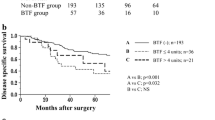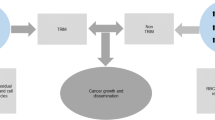Abstract
Background
Leukocyte-depleted packed red blood cells (PRBC) were introduced to reduce potential immunomodulatory effects and transfusion-associated morbidity. It has, however, remained unclear, if leucocyte depletion prevents negative side effects of blood transfusion. The aim of this analysis was to examine the effects of leukocyte-depleted PRBC on surgical morbidity after elective colon cancer surgery.
Methods
Data were prospectively collected from 531 consecutive patients undergoing elective colon cancer surgery at a single high-volume center (University Hospital) from 2002 to 2008. Potentially predictive factors for surgical morbidity were tested on univariate and multivariate analysis.
Results
A total of 531 patients with colon cancer were included. A curative (R0) resection was performed in 497 patients (94%). The mortality rate, overall morbidity rate, and surgical morbidity rate were 1.1, 33, and 21%, respectively. Some 135 patients (25%) received perioperative transfusion of PRBCs. On multivariate analysis age (odds ratio [OR] 1.04, 95% confidence interval [95% CI] 1.02–1.06; P = 0.001), BMI (OR 1.08, 95% CI 1.03–1.13; P = 0.003), and PRBC transfusion (2.4, 1.41–4.11; P = 0.001) were revealed as independent predictors of surgical morbidity. The risk of surgical complications increased continuously with the amount of transfused PRBCs. The adverse impact of PRBC transfusion was neither restricted to the timepoint of transfusion (intraoperative or postoperative), nor to the kind of complication (infectious vs noninfectious complication).
Conclusion
Perioperative transfusion of leukocyte-depleted PRBCs has a significantly negative effect on surgical morbidity of patients undergoing elective colon cancer surgery. The use of perioperative blood transfusions in these patients should be avoided, whenever possible.
Similar content being viewed by others
References
Weitz J, Koch M, Debus J, Hohler T, Galle PR, Buchler MW. Colorectal cancer. Lancet. 2005;365:153–65.
Fazio VW, Tekkis PP, Remzi F, Lavery IC. Assessment of operative risk in colorectal cancer surgery: the Cleveland Clinic Foundation colorectal cancer model. Dis Colon Rectum. 2004;47:2015–24.
Bokey EL, Chapuis PH, Fung C, Hughes WJ, Koorey SG, Brewer D, et al. Postoperative morbidity and mortality following resection of the colon and rectum for cancer. Dis Colon Rectum. 1995;38:480–6.
Longo WE, Virgo KS, Johnson FE, Oprian CA, Vernava AM, Wade TP, et al. Risk factors for morbidity and mortality after colectomy for colon cancer. Dis Colon Rectum. 2000;43:83–91.
Canivet JL, Damas P, Desaive C, Lamy M. Operative mortality following surgery for colorectal cancer. Br J Surg. 1989;76:745–7.
McArdle CS, McMillan DC, Hole DJ. The impact of blood loss, obstruction and perforation on survival in patients undergoing curative resection for colon cancer. Br J Surg. 2006; 93:483–8.
Vamvakas EC, Blajchman MA. Deleterious clinical effects of transfusion-associated immunomodulation: fact or fiction? Blood. 2001;97:1180–95.
Jensen LS, Kissmeyer-Nielsen P, Wolff B, Qvist N. Randomised comparison of leucocyte-depleted versus buffy-coat-poor blood transfusion and complications after colorectal surgery. Lancet. 1996;348:841–5.
Titlestad IL, Ebbesen LS, Ainsworth AP, Lillevang ST, Qvist N, Georgsen J. Leukocyte-depletion of blood components does not significantly reduce the risk of infectious complications. Results of a double-blinded, randomized study. Int J Colorectal Dis. 2001;16:147–53.
Sobin LH, Wittekind C. UICC: TNM Classification of Malignant Tumors. 6th ed.. London: Wiley, 2002.
Herfarth C, Hohenberger P. [Lymphadenectomy as the primary therapy of colorectal cancers]. Chirurg. 1989;60:139–47.
Cox DR. Regression models and life-tables. J R Stat Soc Series B Stat Methodol. 1972;34:187–220.
Brunson ME, Alexander JW. Mechanisms of transfusion-induced immunosuppression. Transfusion. 1990;30:651–8.
Opelz G, Sengar DP, Mickey MR, Terasaki PI. Effect of blood transfusions on subsequent kidney transplants. Transplant Proc. 1973;5:253–9.
Duffy G, Neal KR. Differences in post-operative infection rates between patients receiving autologous and allogeneic blood transfusion: a meta-analysis of published randomized and nonrandomized studies. Transfus Med. 1996;6:325–8.
Weitz J, D’Angelica M, Gonen M, Klimstra D, Coit DG, Brennan MF, et al. Interaction of splenectomy and perioperative blood transfusions on prognosis of patients with proximal gastric and gastroesophageal junction cancer. J Clin Oncol. 2003;21:4597–603.
Smothers L, Hynan L, Fleming J, Turnage R, Simmang C, Anthony T. Emergency surgery for colon carcinoma. Dis Colon Rectum. 2003;46:24–30.
Jestin P, Nilsson J, Heurgren M, Pahlman L, Glimelius B, Gunnarsson U. Emergency surgery for colonic cancer in a defined population. Br J Surg. 2005;92:94–100.
Willis S, Schumpelick V. [Open colon surgery]. Chirurg. 2005;76:1073–81.
Marusch F, Koch A, Schmidt U, Zippel R, Lehmann M, Czarnetzki HD, et al. Effect of caseload on the short-term outcome of colon surgery: results of a multicenter study. Int J Colorectal Dis. 2001;16:362–9.
Heriot AG, Tekkis PP, Smith JJ, Cohen CR, Montgomery A, Audisio RA, et al. Prediction of postoperative mortality in elderly patients with colorectal cancer. Dis Colon Rectum. 2006;49:816–24.
Weitz J, Koch M, Friess H, Buchler MW. Impact of volume and specialization for cancer surgery. Dig Surg. 2004;21:253–61.
Birkmeyer JD, Stukel TA, Siewers AE, Goodney PP, Wennberg DE, Lucas FL. Surgeon volume and operative mortality in the United States. N Engl J Med. 2003;349:2117–27.
Birkmeyer JD, Siewers AE, Finlayson EV, Stukel TA, Lucas FL, Batista I, et al. Hospital volume and surgical mortality in the United States. N Engl J Med. 2002;346:1128–37.
Rabeneck L, Davila JA, Thompson M, El Serag HB. Surgical volume and long-term survival following surgery for colorectal cancer in the Veterans Affairs Health-Care System. Am J Gastroenterol. 2004;99:668–75.
Schrag D, Panageas KS, Riedel E, Cramer LD, Guillem JG, Bach PB, et al. Hospital and surgeon procedure volume as predictors of outcome following rectal cancer resection. Ann Surg. 2002;236:583–92.
Hilska M, Roberts PJ, Kossi J, Paajanen H, Collan Y, Laato M. The influence of training level and surgical experience on survival in colorectal cancer. Langenbecks Arch Surg. 2004;389:524–31.
Porter GA, Soskolne CL, Yakimets WW, Newman SC. Surgeon-related factors and outcome in rectal cancer. Ann Surg. 1998;227:157–67.
Prystowsky JB, Bordage G, Feinglass JM. Patient outcomes for segmental colon resection according to surgeon’s training, certification, and experience. Surgery. 2002;132:663–70.
Acknowledgment
The authors thank Doris Hall for excellent assistance with data collection.
Disclosure
None.
Author information
Authors and Affiliations
Corresponding author
Additional information
Authors M. Koch and D. Antolovic contributed equally to this study.
Rights and permissions
About this article
Cite this article
Koch, M., Antolovic, D., Reissfelder, C. et al. Leucocyte-Depleted Blood Transfusion is an Independent Predictor of Surgical Morbidity in Patients Undergoing Elective Colon Cancer Surgery—A Single-Center Analysis of 531 Patients. Ann Surg Oncol 18, 1404–1411 (2011). https://doi.org/10.1245/s10434-010-1453-x
Received:
Published:
Issue Date:
DOI: https://doi.org/10.1245/s10434-010-1453-x




